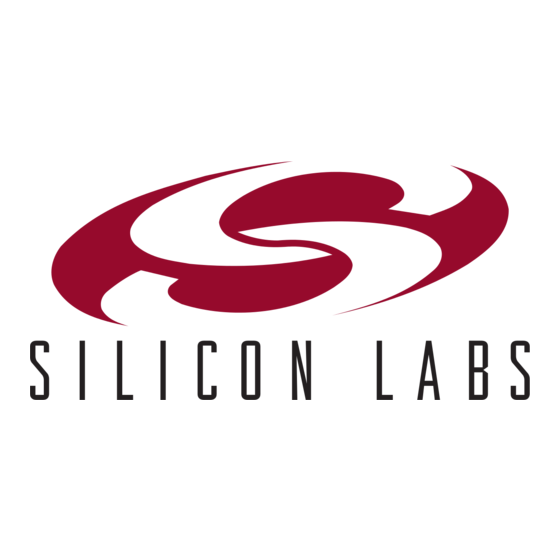
Advertisement
Quick Links
C8051F33
X
1. Kit Contents
The C8051F33x Development Kit contains the following items:
• C8051F330 Target Board
• C8051Fxxx Development Kit Quick-Start Guide
• AC to DC Power Adapter
• USB Debug Adapter (USB to Debug Interface)
• USB Cable
• CD-ROM
2. Hardware Setup Using a USB Debug Adapter
The target board is connected to a PC running the Silicon Laboratories IDE via the USB Debug Adapter as shown
in Figure 1.
1. Connect the USB Debug Adapter to the DEBUG connector on the target board with the 10-pin ribbon cable.
2. Connect one end of the USB cable to the USB connector on the USB Debug Adapter.
3. Connect the other end of the USB cable to a USB Port on the PC.
4. Connect the ac/dc power adapter to power jack P1 on the target board.
Notes:
• Use the Reset button in the IDE to reset the target when connected using a USB Debug Adapter.
• Remove power from the target board and the USB Debug Adapter before connecting or disconnecting the
ribbon cable from the target board. Connecting or disconnecting the cable when the devices have power can
damage the device and/or the USB Debug Adapter.
PC
Rev. 0.7 2/14
D
EVELOPMENT
USB
Cable
Figure 1. Hardware Setup Using a USB Debug Adapter
Copyright © 2014 by Silicon Laboratories
K
U
'
IT
SER
S
AC/DC
Adapter
USB Debug Adapter
SILICON LABORATORIES
P1.6
Port 2
Port 1
C 8 0 5 1 F 3 3 x
G
U I D E
Target Board
PWR
MCU
Port 0
Port 3
Port 4
C8051F33x
Advertisement

Summary of Contents for Silicon Laboratories c8051f33x
- Page 1 • CD-ROM 2. Hardware Setup Using a USB Debug Adapter The target board is connected to a PC running the Silicon Laboratories IDE via the USB Debug Adapter as shown in Figure 1. 1. Connect the USB Debug Adapter to the DEBUG connector on the target board with the 10-pin ribbon cable.
-
Page 2: Software Setup
In the Part Selection step of the wizard, select from the list of installed parts only the parts to use during development. Choosing parts and families in this step affects the displayed or filtered parts in the later device selection menus. Choose the C8051F33x family by checking the C8051F33x check box. Modify the part selection ... - Page 3 C8051F33x 3.1. Running Blinky Each project has its own source files, target configuration, SDK configuration, and build configurations such as the Debug and Release build configurations. The IDE can be used to manage multiple projects in a collection called a workspace.
- Page 4 Download the 8-bit software from the website (www.silabs.com/8bit-software) or use the provided installer on the CD-ROM to install the software tools for the C8051F33x devices. After installation, examples can be found in ...\Examples\C8051F330_5 in the installation directory. At a minimum, the C8051F330 DK requires: ...
- Page 5 C8051F33x information. 7. Once the form is complete, click the Submit button. An email will be sent to the provided email address with the license activation code. 8. Copy the License ID Code (LIC) from the email. 9. Paste the LIC into the New License ID Code (LIC) text box at the bottom of the License Management window in µVision4.
-
Page 6: Target Board
C8051F33x 4. Target Board The C8051F33x Development Kit includes a target board with a C8051F330 device pre-installed for evaluation and preliminary software development. Numerous input/output (I/O) connections are provided to facilitate prototyping using the target board. Refer to Figure 4 for the locations of the various I/O connectors. - Page 7 J9 and J10 and install the crystal at the pads marked Y1. Install a 10 M resistor at R9 and install capacitors at C14 and C15 using values appropriate for the crystal you select. Refer to the C8051F33x data sheet for more information on the use of external oscillators.
- Page 8 C8051F33x 4.3. Expansion I/O Connector (J1) The 22-pin Expansion I/O connector J1 provides access to all signal pins of the C8051F330 device. Pins for +3 V, digital ground and the output of an on-board low-pass filter are also available. A small through-hole prototyping area is also provided.
- Page 9 C8051F33x 4.5. Serial Interface (J5) A RS232 transceiver circuit and DB-9 (J5) connector are provided on the target board to facilitate serial connections to UART0 of the C8051F330. The TX, RX, RTS and CTS signals of UART0 may be connected to the DB-9 connector and transceiver by installing shorting blocks on header J3.
- Page 10 C8051F33x 5. Schematic Rev. 0.7...
- Page 11 C8051F33x OCUMENT HANGE Revision 0.4 to Revision 0.5 Section 1, added USB Debug Adapter and USB Cable. Section 2, changed name from "Hardware Setup" to "Hardware Setup using an EC2 Serial Adapter". Section 2, added 2 Notes bullets.
- Page 12 The products must not be used within any Life Support System without the specific written consent of Silicon Laboratories. A "Life Support System" is any product or system intended to support or sustain life and/or health, which, if it fails, can be reasonably expected to result in significant personal injury or death.
- Page 13 Mouser Electronics Authorized Distributor Click to View Pricing, Inventory, Delivery & Lifecycle Information: Silicon Laboratories C8051F330-TB C8051F330DK...

Need help?
Do you have a question about the c8051f33x and is the answer not in the manual?
Questions and answers